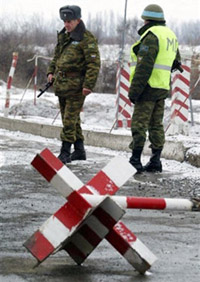Things are not looking too good for the Georgian-Abkhazian conflict zone. On Sunday, Osetians and Russian peacekeepers had formed a blockade on the 100 “blue helmets” rotation of Georgia. In response to that, Georgian peacekeepers have formed a blockade on Tskhinvali and have closed all roads. A couple of days before that, the Georgian parliament had unanimously decided to substitute the Russian peacekeeping forces with others. Ukraine was immediately in favor of this. The Russian Duma made a decision, claiming that it is ready to defend its citizens (most of the people living in the Tskhinvali region are citizens of Russia). The Russian Ministry of Defense is currently conducting military training in North Osetia, which may lead up to invading South Osetia. The de facto president of South Osetia, on the other hand, has announced that any military contingent that will try to be a substitute for Russia will be demolished.
On the verge of a possible war, nobody really paid attention to the Georgian authorities when they tried to start stop the conflict. The conflict settlement’s committee had made the decision to stop the conflict with the initiative taken by Prime Minister Zurab Noghaideli.
“From now on, no Georgian soldier will go to the conflict zone without the permission of the Georgian Ministry of Defense and the Georgian peacekeeping forces,” said Noghaideli to journalists. He adds that the subdivisions of the Georgian Military Police department will be moved from the conflict zone to the Georgian peacekeeping forces. The Prime Minister also announced that the Georgian side will not use the entire quota of the peacekeeping forces.
“Instead of having 500 peackeeping forces, we will have 330 in the conflict zone. At the present, we only have 100 Georgian soldiers,” said the Prime Minister.
The Georgian side is even ready to get rid of its structures with the purpose of dislocating military forces. However, Noghaideli says that it will be impossible as long as there is still snow. He called on the opposite side to learn from Georgia. But it is already clear that the Osetian side will not go along with whatever Tbilisi says. It is also clear that, despite the agreements made a couple of days ago, the committee on zone control will not meet in Vienna after February 20 due to the fact that Russia has refused to participate.
However, it appears that Tbilisi’s Western allies are not too pleased with substituting Russian forces. During his speech at the Georgian Security international forum in Tbilisi, special representative of the chief secretary of NATO in the Southern Caucasus and Central Asia Robert Simons called on Georgia to come to terms with Russia and solve the conflicts within the region.
“NATO will help solve the countries in solving the countries on its behalf, as well as improving ties with the European Union and other international organizations,” said Simons.
According to Simons, it is very important that Georgia fulfill the requirements stated in NATO’s IPAP and continue cooperation.
“The evaluating committee of NATO will be in Georgia in two weeks and the committee will look at the fulfillment of the IPAP requirements. They will meet with Georgian Ministers of Defense and Foreign Affairs in Brussels in March and negotiations will be intensive,” said Simons. He has said and will keep saying that all conflicts within the region must be resolved peacefully. However, the sides are on the edge of their seats to see what will happen.

